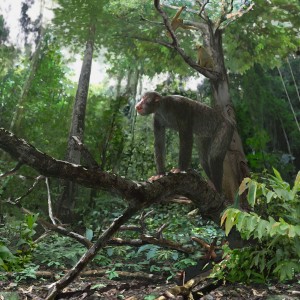
Eighteen million years ago on the flanks of the Kisingiri Volcano (modern day Rusinga Island, Kenya) the early ape Proconsul (center) and the primate Dendropithecus (upper right) inhabited a warm and relatively wet, closed canopy tropical seasonal forest (Illustration credit: Jason Brougham).
Geologists at Baylor, working with an international collaborative team of scientists, have uncovered for the first time direct evidence on Rusinga Island, Kenya, that ties Proconsul, an early ape, to a closed-canopy forest environment. While scientists had previously speculated, based on its skeletal anatomy, that Proconsul would be well suited to living in dense forests, the Baylor team’s discovery provides the first definitive confirmation of the environment in which the ape lived. Results of their research were published this month in Nature Communications.
Lauren Michel, a doctoral student in geology and the study’s lead author, along with a team of collaborators found fossil remains of an individual of Proconsul in a fossil forest system that included tree stump casts, calcified roots and fossil leaves. Based on the tree stump casts found near the remains, Michel and her collaborators were able to conclude that the ape inhabited a dense, closed canopy forest.
“Proconsul is the earliest ape we’ve been able to definitively place in a specific environment,” she says. “This is significant because it helps us get a clearer picture of these animals and their place in the ape/monkey/human family tree.”
Other Baylor co-authors on the paper include Dr. Daniel Peppe, assistant professor of geology, Dr. Steven Driese, professor of geology, and William Horner, a 2012 graduate of Baylor’s geology department. Horner, now in graduate school at Colorado State University, traveled to Kenya as an undergraduate to assist with the Proconsul research, which formed the basis of his senior thesis project.
Read more about the Baylor team’s discovery:
Remnants of an ancient forest provide ecological context for Early Miocene fossil apes
Nature Communications
Discovery by Baylor University Researchers Sheds New Light on the Habitat of Early Apes
Baylor Media Communications release
